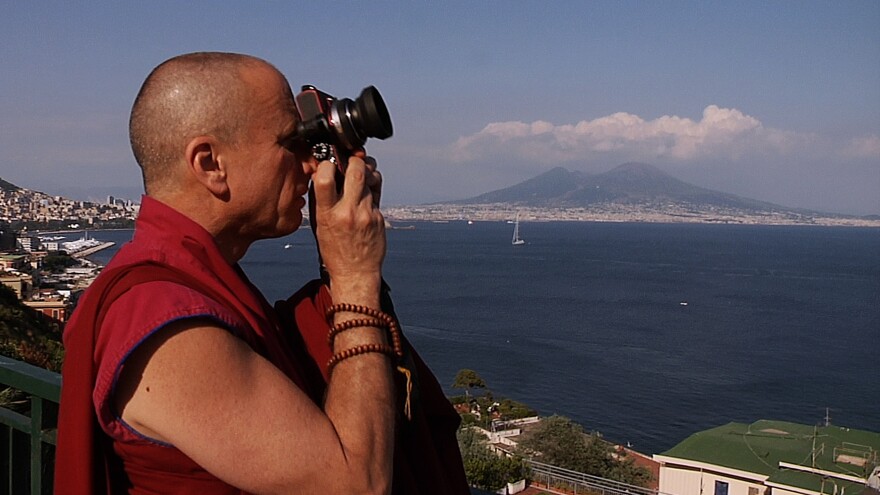In the late 1970s, a young American took leave of his well-heeled, cosmopolitan life to become a Tibetan monk in a remote Indian monastery. Given the times, this was hardly an unusual step, especially among trust-funders who could afford to step away from the daily grind for a spell longer than the obligatory backpacking trek to Katmandu.
So what might make this journey worth shaping into a documentary? For one thing, unlike many who trod similar spiritual paths under the influence of whatever, he's still a monk today. For another, we learn in Monk With a Camera: The Life and Journey of Nicholas Vreeland, there's his name and cultural address. Born into New York aristocracy, Vreeland is the Groton-educated son of a diplomat and the grandson of Diana Vreeland, the famed editor-in-chief of Vogue magazine. Nicky, as everyone calls him, was a flamboyantly put-together dandy who inherited his mother's soulful dark eyes and delicate features. Today, whether supervising renovations at the monastery or striding through his old Manhattan haunts to oblige a pair of admiring filmmakers, Vreeland goes cheerfully about in red robes and a shaved head. Only the Birkenstocks retain a high polish, because "that way they last longer."
It's pleasant to spend time with Vreeland, who comes across as a genuine mensch, a humble and happy man who has found his vocation and his safe harbor serving others in simplicity. He cuts up charmingly for the camera, muttering "polyester and viscose" with mock horror as he fingers robe fabric laid out on a table at the monastery. Richard Gere loves him; so does the Dalai Lama; so does Khylongla Rinpoche, the aged guru for whom he cares with great tenderness at the Tibetan Buddhist Center in New Jersey. Not one of the supportive family, friends and former fashion colleagues tapped for testimonials by directors Guido Santi and Tina Mascara, has a bad word to say about him, unless you count a stepbrother who drily observes of his transformation, ""Somebody might read this as obvious. Yet that is what happened."
Like Santi and Mascara's endearing but unchallenging Chris and Don: A Love Story, a portrait of the long-lived romance between Christopher Isherwood and Don Bachardy, Monk With a Camera is more festschrift than probing inquiry into the significance of one man's momentous life change. As for Vreeland, though clearly enjoying his moment in the sun, he appears serenely less inclined than those around him to make a big thematic deal out of anything. His childhood troubles were champagne woes, perhaps, but painful enough, and almost certainly contributed to his admitted lifelong search for father figures. "Was I unhappy?" he asks of his early years as the rich but emotionally neglected child of socialite parents who casually told their kids they were divorcing over tea at Grandma's. "No more unhappy than anyone else."
Vreeland's father and brothers worry more than he does about his "Western attachment" to the photography he continues to practice, and which he put to good use raising funds to restore and expand the monastery of which he's recently been appointed abbot.
That is a big deal. Buried beneath the admiring encomia and ritual spectacle that clog the pores of this maddeningly tactful film is a tantalizing glimpse into the personal and institutional mechanics of Tibetan Buddhism. Vreeland is the first Westerner to head a monastery, and Monk With a Camera gives us no reason to doubt that he makes a perfectly fine executive. But his appointment by the Dalai Lama himself — who visits with enough bells and whistles to make you wonder if the Duke and Duchess of Cambridge can't be far behind — surely can't be separated from the fact that, like Gere, Vreeland is an American royal with harnessable connections to money and power.
Which may also be why Santi and Mascara gained access to the heavily guarded hotel room where His Holiness met "privately" with Vreeland and Rinpoche, and where he stroked the hand of Vreeland's visibly ailing mentor (who resigned from monkhood many years earlier) while giggling the famous giggle — and calling him "this stupid lama."
Who knows what internal frictions triggered this unguarded departure from pacific public persona? Neither Vreeland nor Rinpoche seem to register His Holiness' passive aggression; Vreeland plainly adores both men. But as one of the few unscripted moments in Santi and Mascara's reverential love letter, it brings the temple down to earth where it belongs. The scene suggests that robes, ritual and all, Tibetan Buddhism functions pretty much like any other institution, religious or not. It's driven by human fallibility in all its rainbow colors.
Copyright 2021 NPR. To see more, visit https://www.npr.org.



